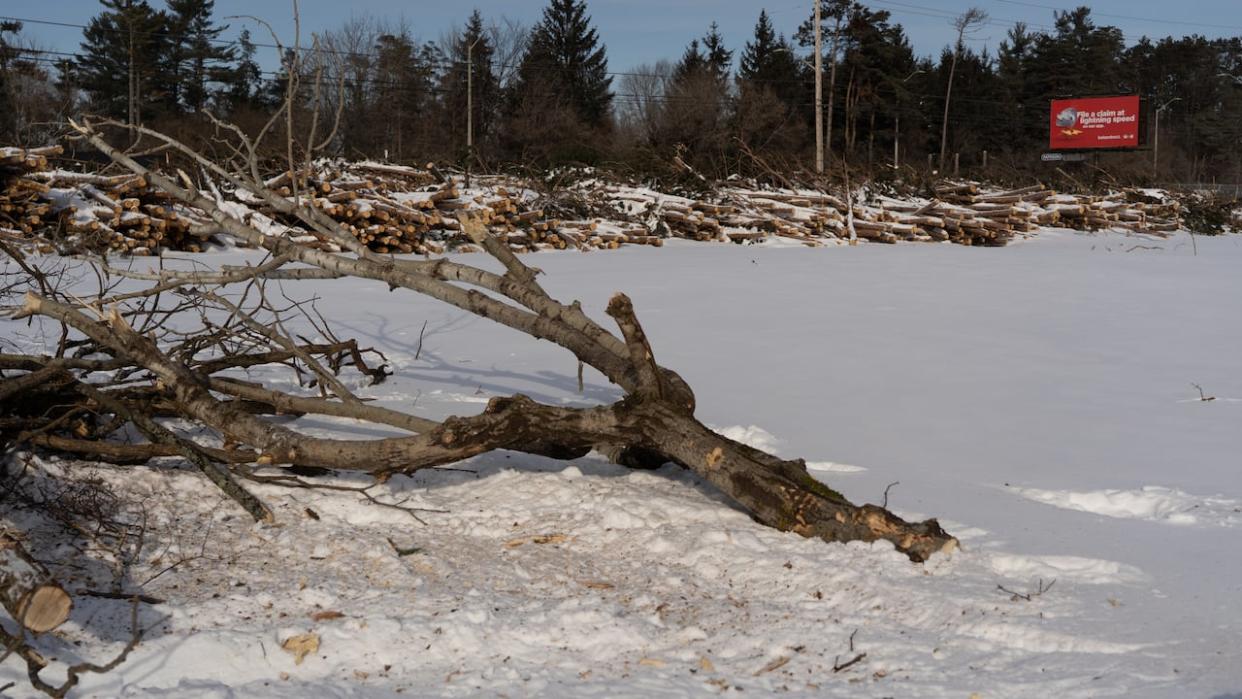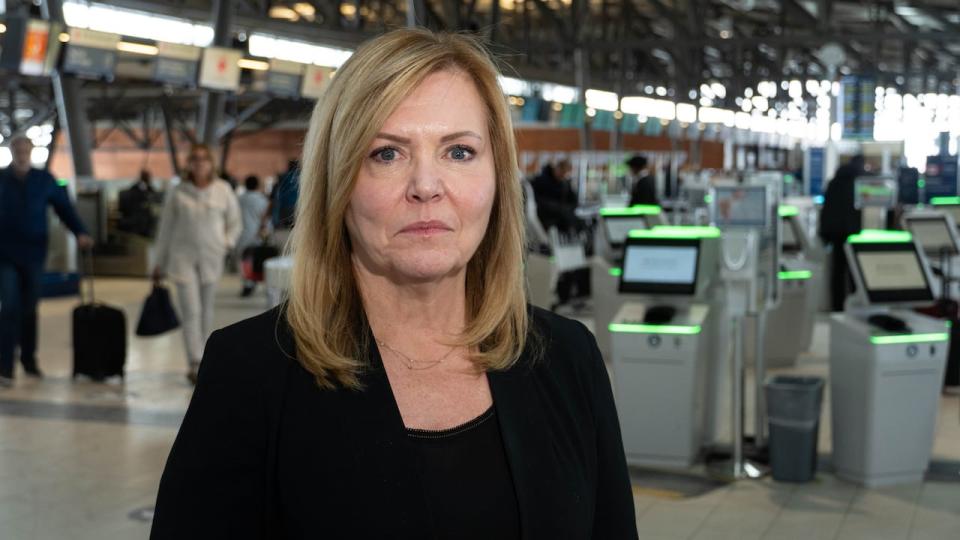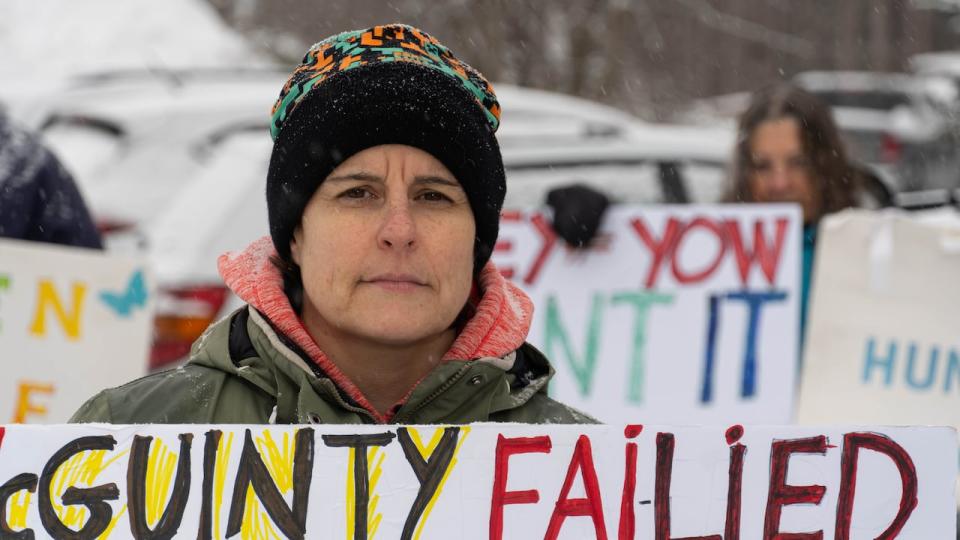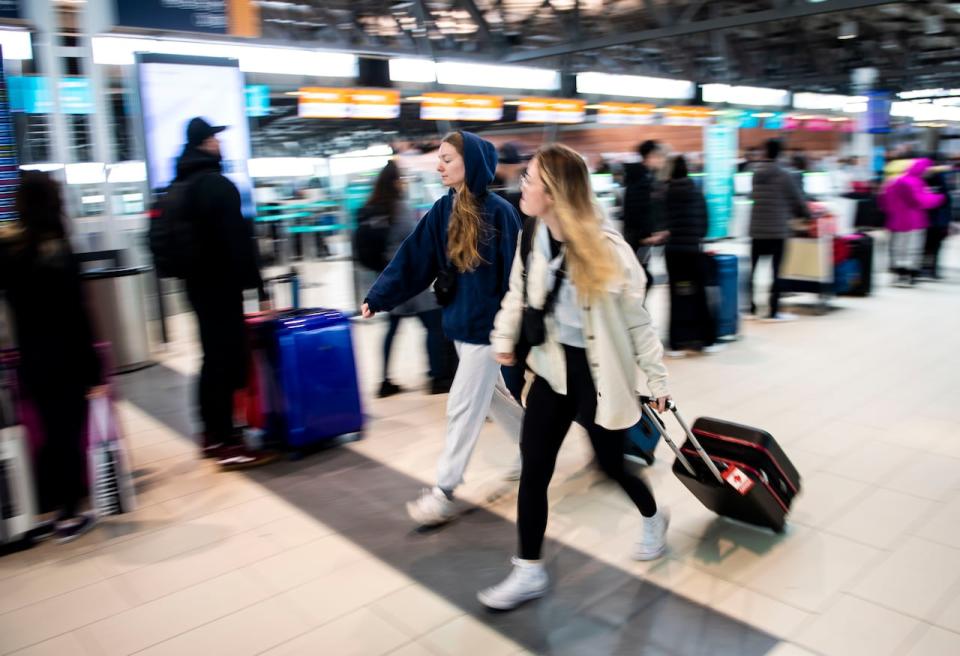Why Ottawa's airport can cut down trees if it wants to

Canada's airport authorities don't have to answer to any level of government for maintaining and developing their federally leased land — including when Ottawa's authority cut down thousands of red pines late last year.
The fate of the trees sparked a community uproar that's lasted years, but the persistent, heated debate over the health of the wooded area on Hunt Club Road was of little actual consequence to the Ottawa International Airport Authority.
It only required the approval from the Canadian Impact Assessment Registry to cut the trees down — approval it received, based on "potential liability" issues posed by their reportedly weakened state.
"The community is being so negative about the airport authority," Krista Kealey, its vice-president of communications and public affairs, told CBC.
"I think they feel ownership of this land. But when you get to the very heart of it, it's private property."
Yet the property is also owned by the federal government and that's left some community members perplexed.

Krista Kealey, the authority's vice-president of communications and public affairs, said the wooded area was slated for development before it was leased from the federal government. (Jean Delisle/CBC)
Airport privatization changed the game
The red pines sat on Transport Canada land and were planted there sometime in the 1950s or 1960s with the idea that they would be one day be made into telephone poles.
The department, however, had little information about the lot's history or why it didn't get the maintenance it needed for the trees to thrive.
It wasn't until 1997 that the public land was leased to the Ottawa International Airport Authority, a private entity newly created through a nationwide shakeup of airport management.
The move was meant to be a shot in the arm for the airport industry, with these not-for-profit corporations using a commercial approach to lithely respond to market changes and better contribute to economic growth.
Instead of pumping millions of taxpayer dollars into operating airports, the Canadian government now receives much more in rent — but there's much less oversight.
Airport authorities are "fully and solely responsible for all aspects of the management, operation and development of the airport lands," wrote Transport Canada spokesperson Hicham Ayoun in a statement to CBC News.
Transport Canada is "contractually obligated to respect [their] independence," Ayoun said.
That straightforward answer is one that Ottawa South MP David McGuinty's office says it's repeated to any residents seeking answers, but community advocates say it's not a satisfying explanation.
Development is the mandate, says airport authority
Carolyn Ewers and her eight-year-old son have many memories exploring the once densely populated woodlot on Hunt Club Road — and many more now protesting its destruction.
She understands that the airport authority had the power to remove the trees, but feels that must be changed.
"We're here [but we're] not enraged," Ewers recently told CBC in an interview near the former woodlot, while showing off a number of well-worn protest signs.
"I mean we are, but we're here rationally wanting to work with the federal government to prevent this from happening again, protecting other green spaces that the airport [authorities] have control over."
For Ewers, that means rewriting the airport authority's mandate — one Kealey succinctly described as "development."

Carolyn Ewers has been advocating to protect the former woodlot for years, with a new focus on re-examining the mandate of airport authorities. (Jean Delisle/CBC)
While some might see the argument to save the trees and prevent that potential development as typically NIMBY, it echoes a debate that's been regularly reignited since the airport authorities were formed.
Within years of their creation, Canada's auditor general identified "significant weaknesses" in the transfer of control and called Transport Canada far too passive in its role as landlord.
Two previous bills aimed at increasing airport regulation failed to become law, after the process was interrupted by federal elections in 2003 and 2006.
Another bill to tighten up airport practices and ensure neighbouring voices are heard on noise complaints is on its second reading in the House of Commons.
Without commercial land, passengers pay
The issue of accountability is, in this case, inextricably tied to commercial viability.
The Ottawa International Airport Authority has an overarching lease with Transport Canada to develop, manage and operate the airport until 2077.
At that time, the airport's infrastructure and all of the surrounding land must be returned to the federal government debt-free and in "world-class" condition — meaning the organization must remain commercially solvent.
The COVID-19 pandemic has shown just how susceptible the industry is to market forces and it's up to airport authorities themselves to chart a way through financial instability.
So if those authorities are going to avoid hitting passengers with costly new fees, they need to make money in other ways. Land marked for commercial activities can become anything from a warehouse to a flight school or a restaurant. The former woodlot, said Kealey, is important for the airport's "economic vitality."
"Every lease that we sign, every piece of land that we develop generates non-aeronautical revenues for the airport," she said.
"Those non-aeronautical revenues help us to keep our aeronautical revenues — which are the fees and charges to airlines — as low as possible."

Ottawa's airport authority said developing commercial land is an important way to keep the fees charged to travellers low. (Justin Tang/The Canadian Press)
The considerable public frustration over a lack of oversight could give the impression that the airport authority resides in some sort of lawless void.
It does not.
The authority's 14-member board of directors includes appointees from all levels of government. Each year the airport authority pays the city an amount equivalent to the taxes it would owe as a private entity.
Transport Canada says the airport authority must follow its approved land use plan, which it did in this case.
Even if the airport authority followed all the rules to the letter, the local city councillor hopes the woodlot saga has shown them the value of meaningful consultation.
"Trees coming down on federal property do not require the permission or the authority from the municipality, in this case the City of Ottawa," said Coun. Riley Brockington.
"If that remains [the case], you alleviate some of the concern in the community by respectfully having a conversation."

 Yahoo News
Yahoo News 
